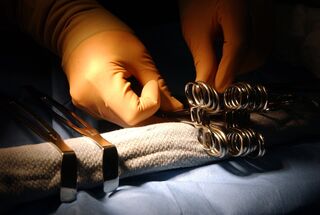Depression
What Everyone Should Know About Post-Surgical Depression
5 tips to reduce depressive symptoms after an operation.
Posted October 5, 2022 Reviewed by Davia Sills
Key points
- Post-surgical depression is a common experience.
- Mental health screenings and realistic expectations can help reduce post-surgical depression.
- Patients can plan ahead to prevent negative thinking and bolster their resilience.

Needing surgery is life-changing—be it elective surgery, where you can schedule your procedure in advance, or emergency surgery due to an urgent medical issue.
Of course, surgery involves physical changes to your body, but there are also many emotional challenges you'll face as you prepare, recover, and heal.
Before you agree to have surgery, one of the issues you, your loved ones, and your surgical team will consider are the risks and benefits of the surgery itself. Knowing in advance the kinds of risk factors (issues that may interfere with successful surgery) and resilience factors (strengths that bolster surgery outcome) can lead to more realistic expectations of surgery. For example, having medical conditions like diabetes, high blood pressure, or mental illness are risk factors for having more post-operative pain. Having live-in family support, good self-care, and other social, economic, and community help are resilience factors that can benefit surgical recovery.
One of the reasons for reviewing the pros and cons that are unique to you also is that it helps to lower the risk of post-surgical depression—a serious and common medical experience.
What Is Post-Surgical Depression?
Post-surgical depression, sometimes called post-operative depression, is a situational type of depression that occurs after you've experienced surgery. Occurring after your procedure or up to one year later, post-surgical depression has a trauma-related onset. A literature review reveals that the majority of studies on post-surgical depression are mostly done on heart surgery patients, followed by orthopedic surgeries. But readers need to know that post-operative depression can occur with any invasive surgery. Readers should also note that sometimes symptoms of post-surgical depression can be misdiagnosed or missed entirely as they're similar to the expected physical and emotional states after surgery:
- Excessive sleeping
- Difficulty sleeping
- Irritability
- Fatigue
- Loss of interest
- Helplessness
- Hopelessness
- Loss of appetite
Risks for Post-Surgical Depression
While medical professionals know that post-operative depression is a common experience, the general public does not appear to be as familiar with the probability. Depression can be a side effect of surgery, so it's important to learn the signs as well as the risks. Studies show that a variety of different issues can contribute to or even cause post-surgical depression.
- Pre-existing Depression: Having a pre-existing depressive disorder can be responsible for post-operative depression. Further, studies show that patients with mental health issues experience higher levels of pain postoperatively and need to work with their surgical team to manage pain effectively to curb post-operative depressive symptoms.
- Subclinical Depression: While clinical depression may not have been diagnosed before surgery, sometimes subclinical or low-grade depressive symptoms can exist before surgery and deepen as a result of the trauma of surgery. This is why screenings before and after surgery, like the Hospital Anxiety and Depression Scale or the Zung Depression Scale, can help patients, as well as hospital staff, understand the kind of physical and mental experiences post-surgery.
- Surgical Trauma and Infections: Surgery, in and of itself, is an enormous shock to the body and the mind and can induce a situational reaction of depression as a result. Post-operative infections and other surgical complications can also contribute to a depressive emotional state.
- Being a Smoker: Tobacco smokers are at significantly higher risk than non-smokers for post-surgical complications, including post-operative depression. New evidence reveals that smokers who stop smoking within 4 weeks or more before surgery have a lower risk of complications and better post-surgical results 6 months afterward.
- Adverse Medication Reactions: Adverse reactions or side effects to medications are common culprits for post-surgical depression. Effects of antibiotics, pain medications, and metabolic management of diseases post-surgery need to be mindfully assessed to ensure that what a patient is experiencing is a medication reaction and not a more fully developed depressive disorder.
- Post-operative Pain: Acute and chronic post-operative pain are significant risk factors for post-surgical depression. Studies have shown that pain causes altered synaptic connectivity at the prefrontal cortex and hippocampus, as well as altered dopamine signaling from the ventral tegmental area. These neurobiological changes link post-operative pain and depression. While pain is an expected experience when having surgery, successful management of it will greatly reduce depressive symptoms.
- Reactions to Anesthesia: The sleepy, numbing, dullness that accompanies anesthesia can also lead to cognitive fog, confusion, and other symptoms of depression, like mood swings, crying jags, and delirium. General anesthesia has a great impact on brain functioning and, as such, is one of the leading causes of post-surgical depression.
- Reality Versus Expectation: Patients who may not be fully prepared for their surgical journey will be at risk for post-operative depression. This preparation includes understanding the medical procedure and the risks and benefits that come with surgery at 6 weeks, 6 months, and even 6 years later. Making sure to follow treatment plans prior to surgery and talking to others who have gone through your surgery can help keep expectations grounded in reality. Individuals who are lax or casual with setting up home care, physical therapy, medication refills, and other post-hospital management will likely experience significant post-operative depression.
Tips to Reduce Post-Surgical Depression
Surgery can be a catastrophic experience, both physiologically and psychologically. Being able to endure and thrive post-surgery is a goal for patients and doctors alike. One of the ways to stack the deck when you're facing the challenge of surgery is to double down on resilience. Learning how to use resilient approaches during extreme stress can not only reduce post-operative depression but also aid in wound healing, pain management, and coping with other post-surgical complications.
Here are some tips to help you be more resilient with surgery and plan for assistance if post-operative depression is experienced.
- Prepare: Do your homework and learn all you can about your surgical procedure. If you're having emergency surgery, you may not have time to gather information, but this doesn't mean that a loved one can't advocate for you and be your rock once you emerge from surgery.
- Plan: Do all you can to ready yourself for the physical changes that will come from your surgical experience. Also, plan for the psychological challenges that arise with surgery. Promise to make self-care a priority and have others available to look after you post-surgery. Access your health insurance for home care and benefits that can aid in your recovery. Reach out to your local community if you need assistance with food or home care.
- Check Your Thoughts: Negative thinking and catastrophizing are common after surgery. Often you think you'll never feel better again. Try to catch these dark thoughts and shift them toward encouraging, hopeful, or more reality-based content. Preserving a sense of positivity in the face of challenges has evidence-based benefits on the mind, body, and soul.
- Create a Team: If you struggle with a mental health issue, make sure you have a team in your corner before, during, and after surgery. Inform your surgeon about your mental health and the medications you take or will need pre- and post-surgery. Involve yourself in talk therapy to prepare for your surgery and ask family, friends, or loved ones to check in on you not only physically but emotionally as well.
- Ask for Help: If you've had a surgical procedure and are feeling sad, lost, irritable, helpless, or hopeless, or if you experience changes in sleeping, eating, and other life issues for two weeks or more, it may be time to contact a mental health professional. Proper diagnosis and treatment of post-operative depression can help you feel better—and return you to an expected trajectory of surgical recovery.
Visit Psychology Today's Therapist Directory to find a therapist near you.


